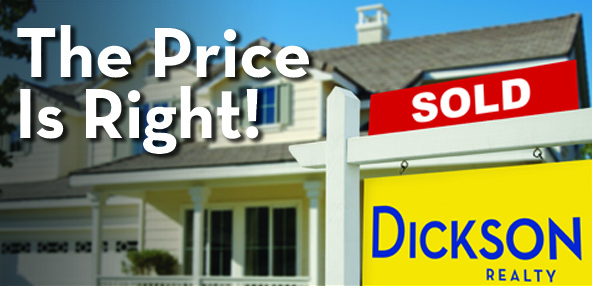The correct price is determined by a lot of different factors such as size, amenities, age, and of course, location, along with making sure you’re pricing as other homes in same area. To better understand how a home will be evaluated, sellers need to consider that their property will be compared to other homes currently on the market in the same area, including the length of time the house has been listed, the homes upgrades and the overall condition of the home. So when you take into account all of these different factors, you get a very good ballpark idea of what you need to list your home for.
So “who says” what a home is worth? The market basically determines the worth, not necessarily an agent or the seller’s opinion. The housing market can change like the weather, which makes it crucial to review median sale prices of “like-type homes” within the past 6-12 months. But since their values could be marginally or significantly different you also should factor in the different variables and be able to come up with a range of what a home should sell for. Appraisers follow this same basic process, but their estimate is what the bank will “loan” on. If you have an experienced Appraiser who is familiar with the area your home is located in, chances are the price they come up with will be in the same price range that your agent has come up with. Other factors that do not affect the price are things like paint, décor, furniture, views, floor plans, etc.

Overpricing a home is dangerous territory. Of course the worst thing that can happen is NOT getting it sold! An overpriced house will most likely stay on the market for a long time. Even if the home has everything a buyer is searching for, buyers may perceive an overpriced home as 1) having owners who are not willing to negotiate, 2) the house becomes “stigmatized” from re-adjusting the price for so long that, i.e. ‘It’s been on the market so long there MUST be something wrong with it’, 3) and bad relations can develop between the agent and the seller. “This is a No-Win situation for everyone,” says Scott Shandrew. “I’ve walked away from more listing than I’ve taken, just for this reason.”
Many homeowners believe “my house is one-of-a-kind.” To put a price on a “unique” home you need to first understand that “uniqueness” is subjective. Some may see it as “strange”, “antiquated” …or “awesome”. The point is no matter how unique your home is you still have to justify a reasonable price with other homes in the immediate area. The “uniqueness” will still be taken into consideration to help determine what your house should sell for.
“For example,” says Scott, “It’s easy to find 2 to 3 track homes a block away that have been built around you ranch home you’ve been in for 30 years. Yours is the same size, same location, but it may be unique in zoning, i.e. horses, a custom home, or it may be antiquated, and may not have infrastructure that some people desire. So the term ‘unique’ can play on both sides of the equation to make your home more valuable, or less desirable.”
 Comparing similar properties, noting the differences among them, tracking the market movements, and taking into account the current inventory…these are all tactics utilized by real estate agents to come up with a range of value for a home.
Comparing similar properties, noting the differences among them, tracking the market movements, and taking into account the current inventory…these are all tactics utilized by real estate agents to come up with a range of value for a home.
When dealing with this level of detail it becomes very apparent you need to work with an experienced agent. It’s the agents responsibility to help guide the seller with open and honest communication as to what the home would sell for. In addition to pricing your property right, an agent is responsible for marketing your home effectively as well.
So if you have a meeting-of-the-minds and everybody is on the same page, then typically you’ll have a much smoother transaction, sell your home in a shorter period of time, and most likely you’ll get more money for your home than overpricing it and chasing the market down. It’s a win-win for everyone.
Contact an experienced Dickson Realty agent today to find out what your home is worth.


